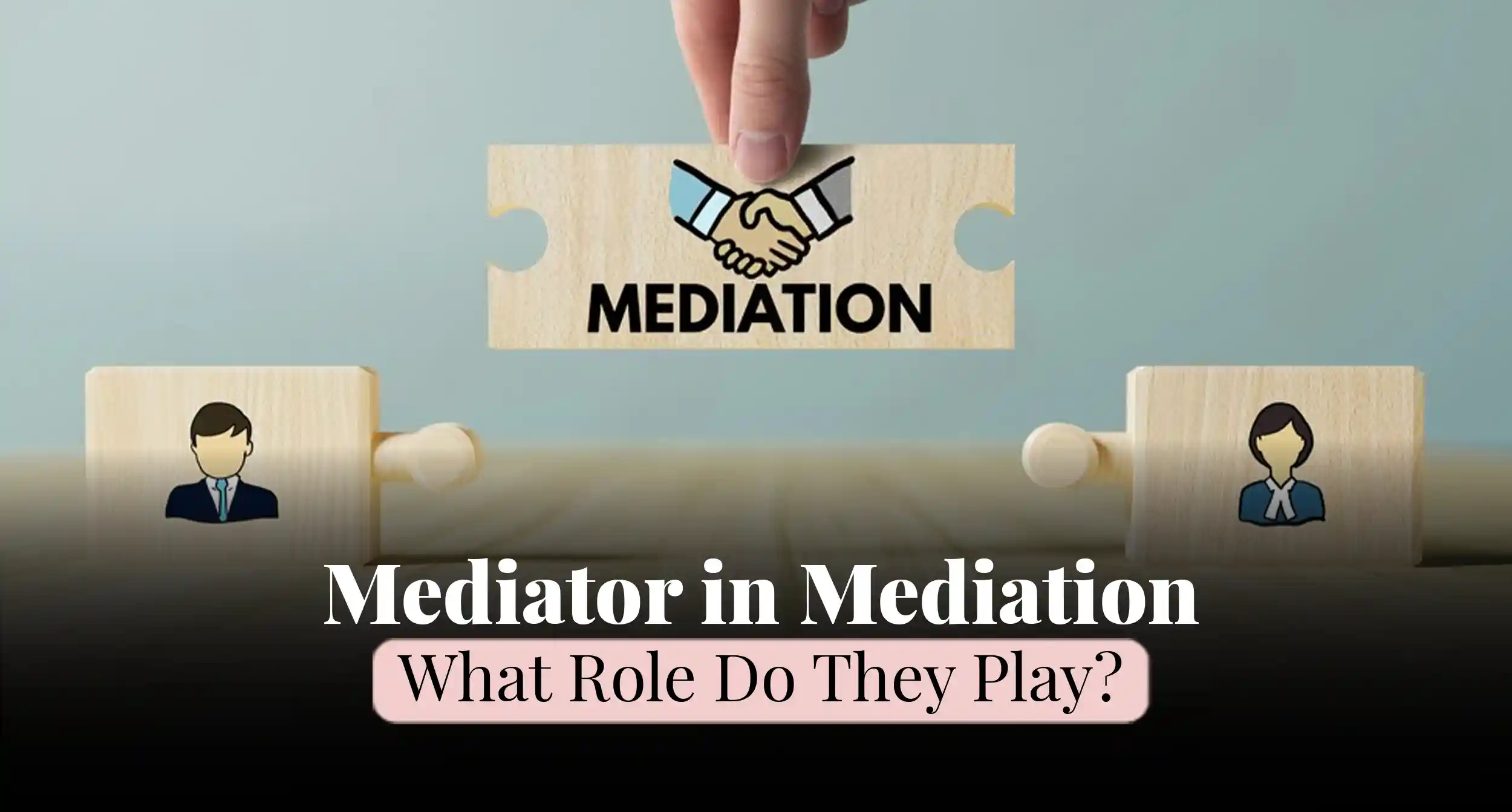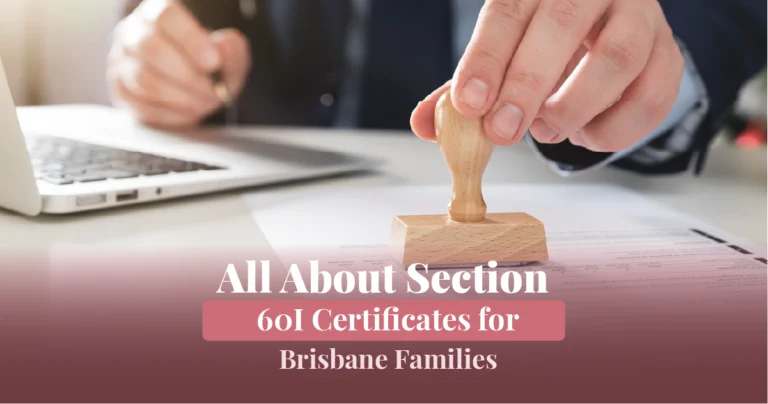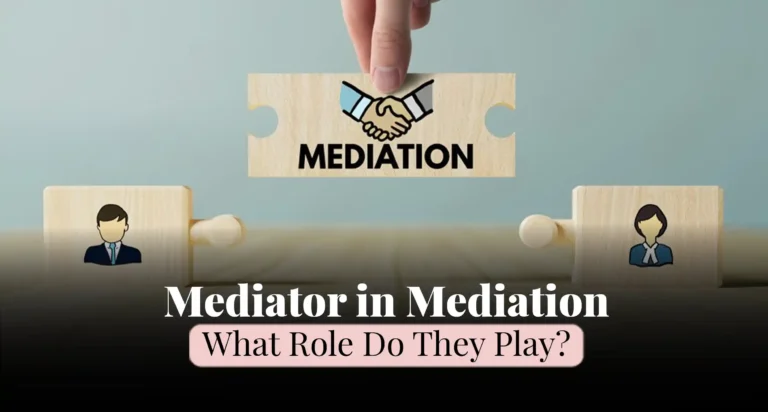MEDIATOR IN MEDIATION: WHAT ROLE DO THEY PLAY?

Share
Table of Contents
-
- Introduction
-
- What Is the Role of a Mediator in Mediation?
-
- Family Mediation vs. Legal Representation: Key Differences
-
- Can a Mediator Give Legal Advice?
-
- How to Choose a Qualified Family Mediator?
-
- Conclusion
-
- FAQs
Introduction
Mediation is a far more conciliatory way to resolve disputes in a more cost effective manner than court could provide. Whether it’s a parenting disagreement or a property settlement, the mediator in mediation is the key player who helps families find common ground. At Summit Conflict Resolution, owned by experienced family law mediator Janelle Rollo, we provide a variety of services such as Parenting Family Dispute Resolution services , Section 60I Certificates, Property Settlement & Finances. In this blog, we will explore the role of a mediator, whether family law mediation is better than retaining a lawyer, and whether mediators provide legal advice. We will also provide you with suggestions on how to select an appropriate family law dispute resolution practitioner, or mediator in Australia. If you’re navigating a family law dispute, understanding the role of a family dispute resolution practitioner or mediator can help you understand the process and how you can move forward.
What Is the Role of a Mediator in Mediation?
A mediator in mediation is like an impartial ref who helps both sides talk it out and come up with a solution that works for everyone. They don’t render decisions like a judge or arbitrator but instead create a safe space for open, honest conversations. Here’s what a mediator does:
-
- Keeps the Conversation Flowing: Mediators ensure everyone has the opportunity to share their viewpoint and resolving misunderstandings. For Parenting Arrangements, they assist parents in hammering out co-parenting plans.
-
- Calms the Storm: They keep things civil, particularly during heated mediation sessions, especially during family law mediation.
-
- Finds Common Ground: Mediators spot shared goals, such as negotiating a Property Settlement to avoid expensive court proceedings.
-
- Steers the Process: They will walk you through the steps of the mediation process, making it clear for disputes like Parenting mediation. Should you not be able to resolve your dispute and the mediator is a registered Family Dispute Resolution Practitioner with the Attorney-General’s office, such as Janelle is, she is then able to issue a section 60I Certificate which enables parties to proceed to court.
-
- Stays Neutral: Mediators don’t take sides, building trust and enabling resolution .
At Summit Conflict Resolution, Janelle Rollo helps a separated or divorced couple nail down a Parenting Arrangement. Mediation is a ripper option, costing $500–$5,000 to court’s $25,000–$100,000, and it’s quicker too. From Family Dispute Resolution to property dispute mediation, mediators empower you to take charge of the outcome.
Family Mediation vs. Legal Representation: Key Differences
When you’re facing a family dust-up, after separation such as a parenting problem, for example — you may wonder whether you should pursue family dispute resolution or hire a lawyer for legal representation. You can do both, but they’re chalk and cheese about how they work, what they cost and what you get. Here’s the lowdown:
-
- Approach:
-
- Family Dispute Resolution: A mediator gets everyone talking to sort out arrangements both parties can live with, focusing on stuff like Parenting Arrangements or Property Settlement & Finances. If you’re breaking down at all, it’s not tearing strips off each other.
-
- Legal Representation: Lawyers will advocate for your side, often in family dispute resolution or mediation settings, as well as court, turning family law disputes into a right barney.
-
- Approach:
-
- Cost:
-
- Mediation: It’s easier on the wallet, with mediation costs from $150–$500 per hour or $500–$5,000 total. Legal aid for family law mediation is available for anyone who is eligible.
-
- Legal Representation: Court can cost anywhere from $25,000–$100,000+, which isn’t exactly loose change.
-
- Cost:
-
- Time:
-
- Mediation: Wraps up in days or weeks, ideal for separating couples where time is of the essence.
-
- Legal Representation: Court proceedings can go on for years, wearing you down and making your costs of court proceedings spiral.
-
- Time:
-
- Control:
-
- Mediation: You and the other party decide the outcome, with the mediator’s help, like in custody mediation
-
- Legal Representation: A judge decides, and you might not like the outcome.
-
- Control:
-
- Emotional Toll:
-
- Mediation: Family law mediation services keep things less stressful by working together.
-
- Legal Representation: Court fights can leave you frazzled, especially in custody and property disputes.
-
- Emotional Toll:
At Summit Conflict Resolution, Janelle Rollo uses her extensive years of experience as a Family Lawyer and family Dispute Resolution Practitioner to help families sort out Parenting Arrangements or Property Settlement & Finances without a courtroom showdown. If mediation is not good enough or you need legal muscle, lawyers are the go, and you can have your solicitor attend the mediation with you which can be particularly helpful in tricky cases. Often, combining mediation with a lawyer’s attendance at mediation and advice during the mediation is the sweet spot.
Can a Mediator Give Legal Advice?
A key question is whether a mediator in mediation can serve up legal advice. The short answer: Nope, not at all. Here’s why:
-
- Staying Neutral: Mediators have to be fair, not picking sides, especially in family dispute resolution processes.
-
- Job Scope: They guide the steps of the mediation process, not give legal tips.
-
- Qualifications: Mediators can come from various disciplinary backgrounds. Some are social workers or psychologists. Some have law degrees. But all family Dispute Resolution Practitioners must have completed comprehensive training to become a mediator and then have completed extensive supervised training and meet certain guidelines to become and remain an accredited Family Dispute Resolution Practitioner registered with the Commonwealth Attorney-General’s Office to be able to issue a section 60I certificate. Mediators in Australia, like Janelle Rollo, are very experienced in practicing Family Law in her role as a mediator, and stays neutral in family mediation to keep things above board.
Need legal advice for divorce mediation services? Get a lawyer or at the very least seek some legal advice as you commence the process to ensure you know what your obligations and entitlements are. Mediators are able to provide a mediation consultation outlining how mediation works or direct you towards some options such as legal aid mediation. At Summit, Janelle clarifies mediation costs. This keeps the mediation focused on sorting things out, not practising law.
How to Choose a Qualified Family Mediator?
Picking the right family law mediator is make-or-break for nailing Parenting Arrangements or Property Settlement & Finances. With ‘find a mediator’ on the rise, here’s how to find a qualified mediator in Australia:
-
- Check Their Creds:
-
- If your dispute is about Parenting arrangements, ensure your mediator is a registered Family Dispute Resolution Practitioner registered with the Commonwealth Attorney-General’s Office to issue a section 60I certificate. This ensures that if your dispute doesn’t resolve at mediation, a section 60I certificate can be issued by the mediator and your matter can proceed to court.
-
- Find mediators accredited under the National Mediation Accreditation Standards, which means they’re up to scratch.
-
- You should note that whilst mediators who have qualifications as psychologists and social workers are great mediators, they don’t necessarily know Family Law and what can be reduced to a court order or even sealed by the Family Court as they do not hold a law degree.
-
- Check Their Creds:
-
- Family Mediation Experience:
-
- Choose those mediators who are knowledgeable of the Family Law Act (As Amended) 1975 (C’th), particularly for Parenting Arrangements.
-
- You need to be aware that most disputes are resolved through mediation, in fact, almost 90% of all Family Law disputes are resolved through mediation, with only the most difficult of cases proceeding to court.
-
- Family Mediation Experience:
-
- Clear Costs:
-
- Ask about family law mediation costs , expecting $150–$660 per hour. Check if you might get legal aid for family mediation.
-
- You should compare private mediation services with more affordable ones like Government funded Family Dispute Resolution services such as Relationships Australia, Centrecare and Family (can’t think of the name of organisation just now- it will come to me) offered across Australia.
-
- Clear Costs:
-
- Neutrality and Style:
-
- Ensure they’re neutral, essential for Family Dispute Resolution. During a mediation intake, ask what form of dispute resolution they adopt. Is it facilitative or some other form of mediation format?
-
- Search for reviews that rate them the best mediator for peace of mind.
-
- Neutrality and Style:
-
- Local Know-How:
-
- When selecting mediators, look for Family Dispute Resolution Practitioners as only these specifically qualified mediators are able to issue section 60I certificates.
-
- For nearby areas, consider family dispute resolution practitioners on the Sunshine Coast or Gold Coast.
-
- Local Know-How:
Summit Conflict Resolution, led by Janelle Rollo, offers accredited mediators for mediation in family law disputes. Book a mediation intake to tackle custody matters and /or Property Settlement & Finances. Always double-check credentials and mediation fees to avoid surprises.
Conclusion
Mediators in Family Law Mediation are the glue that holds everything together and help you transform family disputes into workable agreements. Unlike a lawyer, you are in charge of your mediation and you will save yourself a lot of money compared to the court’s $25,000–$100,000. Mediators such as Janelle Rollo do not provide legal advice to ensure fairness, but they apply their extensive skills and knowledge of the Family Law Act (As Amended) 1975 (C’th) to help with Parenting Arrangements, issuing section 60I Certificates, if your Parenting dispute doesn’t resolve Property Settlement & Finances. When you choose a mediator you need to note their accreditation, experience and knowledge of mediation services.
Now you have decided that you’re ready to work through your dispute, contact us at Summit Conflict Resolution for professional family law mediation and take that as a first step towards resolving your dispute!
FAQs
1. What does a mediator do in family mediation?
A mediator helps families work through Parenting Arrangements or Property Settlement & Finances, guiding them to agreements without deciding for them.
2. How much does family mediation cost in Australia?
Mediation costs range from $150–$660 per hour or $500–$10,000 total. Some eligible Australian families may get legal aid for family mediation.
3. Can a mediator give legal advice?
Nope, mediators stay neutral and don’t offer legal advice. For family law mediation, get a separate lawyer, if you want or need any legal advice.
4. How do I find a qualified mediator in Brisbane?
Look for accredited Family Dispute Resolution Practitioners, they are mediators with experience conducting family law mediation services and check reviews for mediation services.
5. Is mediation cheaper than court?
Mediation is way cheaper ($500 – $10,000) and quicker than litigation ($25,000 – $100,000) for family law disputes.


